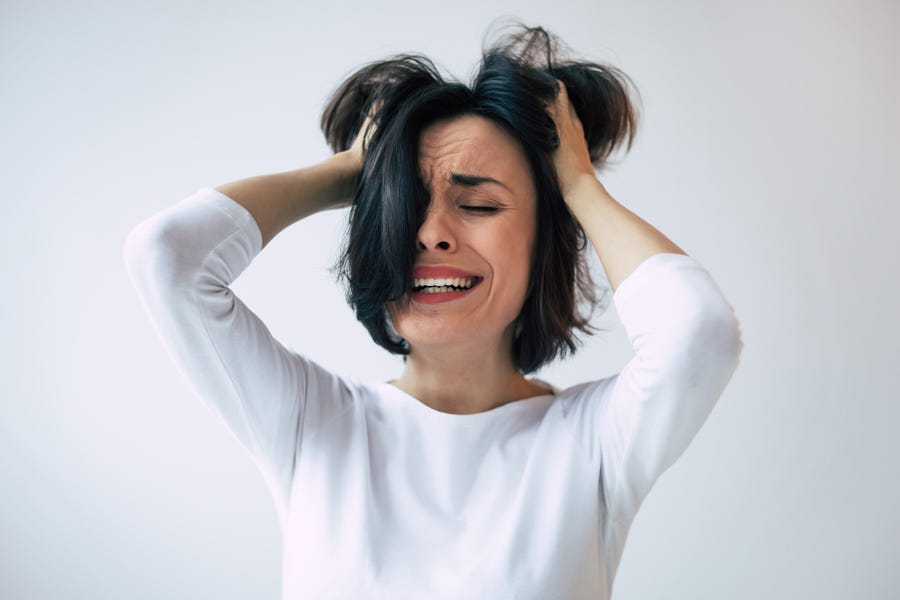 |
Keeping it Together | WISDOM AND TIPS FOR MENTAL HEALTH AND WHATEVER LIFE THROWS AT US | Tuesday, July 20 | | |
| |
| |
| |
| |
| On Saturday I will be facing one of my biggest pandemic fears: An airplane. |
| On the one hand, it's a moment of great joy. After getting fully vaccinated, I am flying to Michigan to visit my sister and her family, and that will include meeting my nephew who was born during the pandemic. It will both be my first long-distance family visit since the onset of COVID-19 and my first real vacation since Christmas 2019. I am extremely excited. |
| But also, there is a huge amount of trepidation. Cases are rising again across the country and airplanes have been a source of tension and even violence in recent months. Although I've braved some more normal activities since vaccination like going to the movies and going to small gatherings with vaccinated friends and family, the idea of being in a space as small and crowded as an airplane does raise my anxiety level. |
| Like with many other anxieties and fears, I am attempting to employ coping mechanisms to calm myself and ensure my trip can be as enjoyable as possible. I'll lean on mindfulness, breathing techniques, distraction and more. |
| I'm not sure how I'll feel about flying at the end of this trip, but my newfound phobia is making me realize the pandemic has heightened so many of our collective fears and anxieties. It's a reminder to be gentle with ourselves as we ease back into the world, and maintain common-sense safety measures. |
Losing your hair? Stress may be to blame. |
| Raise your hand if this has every happened to you. It's a particularly stressful time in your life, and you notice you're shedding far more hair than usual in the shower. If you have experienced this,you're not alone. |
| Sara Moniuszko investigated the phenomenon where stress induces hair loss, and she found that it's often temporary. |
| Dr. Caroline Robinson, a dermatologist and founder of Tone Dermatology, told USA TODAY one of the most common reasons for hair loss is stress. |
| "When our body experiences extreme stress such as following a surgery, death of a loved one, child birth, viral infection or as even as a result of the ongoing global pandemic itself, we can experience a large shift in our hairs from the growing phase to the shedding phase months later," she explains. "This is... a condition called telogen effluvium, and it is far more common than many realize." |
| Telogen effluvium can also be triggered by major physical trauma, extreme weight loss, extreme change in diet, abrupt hormonal changes or iron deficiency, according to the Harvard Medical School. |
| Dr. Samer Jaber, a dermatologist at Washington Square Dermatology in New York, adds that stress-related hair loss is generally not permanent. |
| "Telogen effluvium generally resolves on its own after a few months, although in some patients it can be chronic," he explains. |
| Read more about stress-related hair loss here. And here's wishing everyone some de-stressing this week. |
 | | Stressed? That may be the reason for your hair loss. | | Povozniuk, Getty Images/iStockphoto | |
Today's reads |
| |
 | | An open office with people at their computers looking at financial data on monitors. | | Getty Images | |
Today's pet |
| If this isn't the happiest dog I've ever seen... |
 | | Oscar, you have a smile that could be in a Crest Whitestrips ad. | | Courtesy Dianne Kresich | |
| Meet Oscar. "He is a charming guy who is also a clown, although I don't think he knows it," according to his owner, Dianne Kresich. |
| Oscar you are welcome to clown around with me anytime. |
| That's all for this Tuesday. The newsletter will be back in your inboxes on Saturday. Don't forget to keep sending in pet photos, feedback and your personal experiences to our email here. We love to hear from you. |
| All my very best, |
| Kelly Lawler |
| |
| |
| |
| |